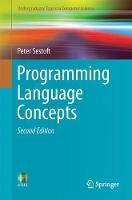


|
|
|
books
| book details |
Programming Language Concepts
By (author) Peter Sestoft

|
| on special |
normal price: R 1 777,95
Price: R 1 600,95
|
| book description |
This book uses a functional programming language (F#) as a metalanguage to present all concepts and examples, and thus has an operational flavour, enabling practical experiments and exercises. It includes basic concepts such as abstract syntax, interpretation, stack machines, compilation, type checking, garbage collection, and real machine code. Also included are more advanced topics on polymorphic types, type inference using unification, co- and contravariant types, continuations, and backwards code generation with on-the-fly peephole optimization. This second edition includes two new chapters. One describes compilation and type checking of a full functional language, tying together the previous chapters. The other describes how to compile a C subset to real (x86) hardware, as a smooth extension of the previously presented compilers.The examples present several interpreters and compilers for toy languages, including compilers for a small but usable subset of C, abstract machines, a garbage collector, and ML-style polymorphic type inference. Each chapter has exercises.  Programming Language Concepts covers practical construction of lexers and parsers, but not regular expressions, automata and grammars, which are well covered already. It discusses the design and technology of Java and C# to strengthen students’ understanding of these widely used languages.
| product details |

Normally shipped |
Publisher | Springer International Publishing AG
Published date | 12 Sep 2017
Language | English
Format | Paperback / softback
Pages | 341
Dimensions | 235 x 155 x 0mm (L x W x H)
Weight | 0g
ISBN | 978-3-3196-0788-7
Readership Age |
BISAC | computers / compilers
| other options |
|
|
|
To view the items in your trolley please sign in.
| sign in |
|
|
|
| specials |
|
This first comprehensive biography of Cecil Rhodes in a generation illuminates Rhodes’s vision for the expansion of imperialism in southern Africa, connecting politics and industry to internal development, and examines how this fueled a lasting, white-dominated colonial society.
|
Let's stare the future down and, instead of fearing AI, become solutionists.
|
|
|
|
|
|